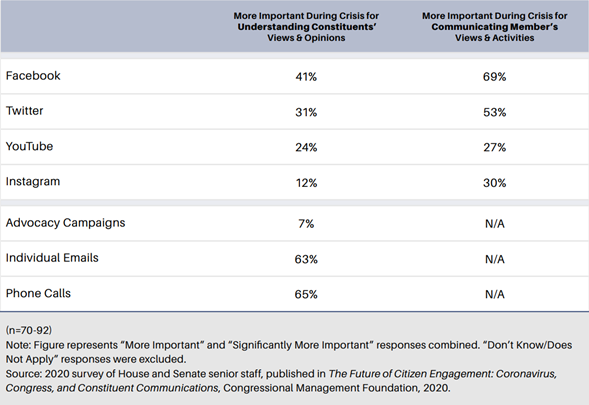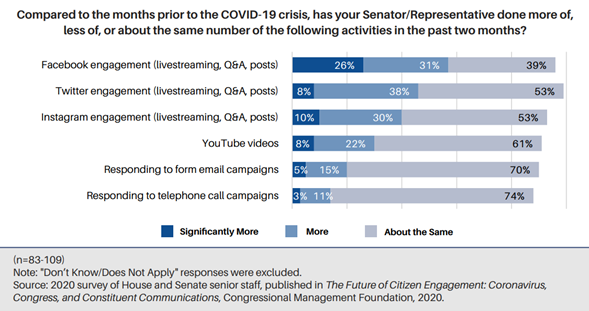For many House and Senate offices, personal contacts with constituents became significantly more important during the pandemic for understanding those they represent. Social media also became more important for understanding constituents and for communicating out to them. Advocacy campaigns, on the other hand, mostly maintained or lost importance during COVID-19.

"I have personally called constituents at their homes more since telework began than during any other time in this office. And I know other coworkers are doing the same. I think the more direct contact we provide to people, the more they feel heard." —House Legislative Director
Though social media became more important to them, many offices maintained their pre-COVID-19 engagement levels on most of the platforms. Some offices increased their social media efforts, but only a small percentage significantly increased them. However, a surprising percentage of offices did significantly increase their use of Facebook. Interviews with senior staffers explained that some offices used Facebook Live for town hall meetings with larger groups of constituents, which increased their reliance on Facebook during the pandemic. Interestingly, most offices maintained their efforts to respond to email and telephone advocacy campaigns, despite the fact that they did not increase in importance to offices' understanding of or communication with their constituents. That they largely maintained their pre-COVID-19 efforts is impressive given the increase in volume and the administrative challenges that came with distributed staffs and remote work.

As COVID-19 changes the way we work, we may find that our new normal is in some ways more efficient and better for our workload. Much of Congress' work involves engaging with constituents and meeting their needs, but quarantines posed challenges to the way things were done. In May and June of 2020, CMF surveyed senior congressional staffers to find out how Congress and their offices are adjusting to the abrupt changes, and how it has affected the relationship with their constituents. We discussed seven key findings in the report The Future of Citizen Engagement: Coronavirus, Congress, and Constituent Communications.
Stay tuned this winter for the next report in this series The Future of Citizen Engagement: Pre-COVID Challenges to Constituent Communications.
William Mioduszewski is a recent graduate at William Paterson University and majored in Political Science. He interned remotely with the Congressional Management Foundation from September-December 2020.


